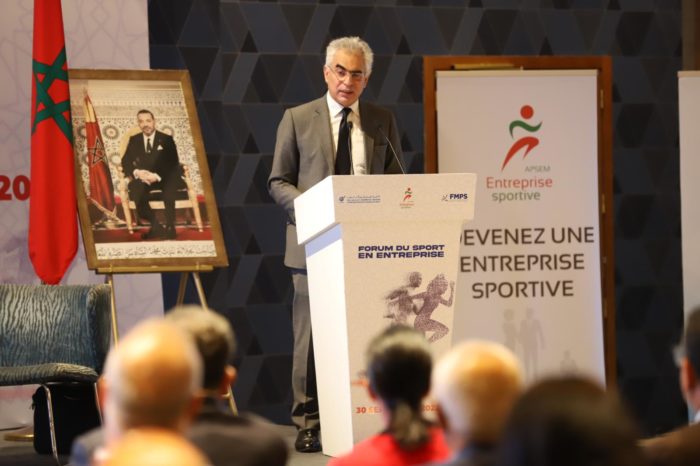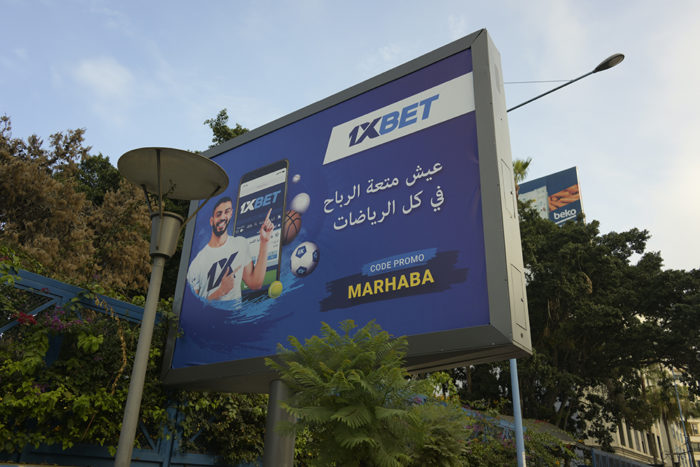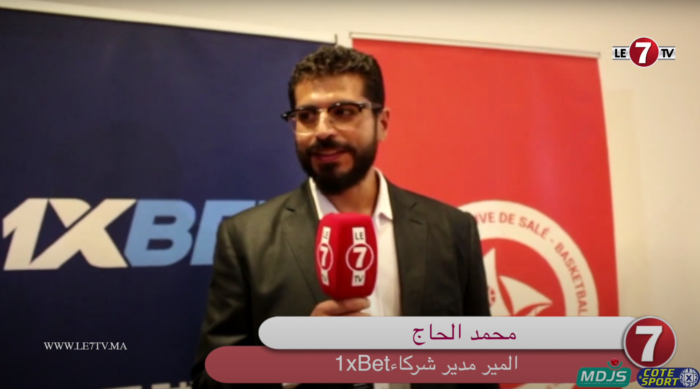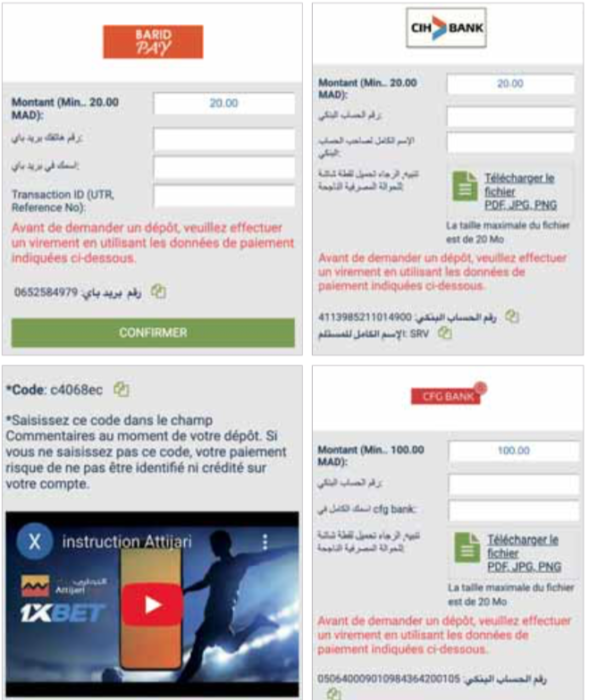The scene takes place at the end of 2022. Gathered in a living room in Rabat, a group of friends watches the match between Jaouad El Yamiq’s Valladolid and Karim Benzema’s Real Madrid. The Merengues lead 2-0, but the penalty scored by the Ballon d’Or winner is not the main topic of conversation. The group is more intrigued by a sports betting operator from Russia.
The legality of the betting operator stirs up debate among the friends. Some recall the monopoly held by the Moroccan Games and Sports Authority (MDJS) on sports betting as proof of 1XBET’s illegality in Morocco. On the other hand, some argue authoritatively that 1XBET advertises on billboards in the streets of Casablanca and Rabat. Why would the state allow this if it were illegal?
The debate pauses momentarily. On the screen, the Brazilian Vinicius Junior charges down the left side. And the match’s advertising board displays… a 1XBet ad. « The Spanish surely conduct security checks. Do you think La Liga (the Spanish league, editor’s note) would risk its legitimacy? » says one member of the group, as if to conclude the debate.
Appearances are … deceiving
“A sports bet is considered illegal if the bet in question or the operator offering it is not authorized in Morocco”
1XBET uses these reassuring signs precisely to mask the reality. The operator is illegal; Moroccan law is clear on that matter. In a letter addressed to its media partners who advertised 1XBET, which TelQuel was able to review, the head of the MDJS (Moroccan Games and Sports Authority) is unequivocal: “The sports bets offered by 1XBET are illegal in Morocco. Indeed, a sports bet is considered illegal if the bet in question or the operator offering it is not authorized in Morocco,” reads the letter signed by Younes El Mechrafi, head of MDJS.
The MDJS bases its stance on the monopoly granted to it by the state following the agreement signed in 2016 between the operator and the departments of Finance and Sports. This document stipulates that the MDJS holds the monopoly on organizing and receiving sports bets throughout Moroccan territory. This applies even if the sporting events are organized abroad or online (the MDJS also holds a monopoly on e-sports betting).
The document also establishes the role of the MDJS as the principal financier of the National Fund for the Development of Sports, which aims to support the country’s sports federations and contribute to the improvement of sports infrastructure.
In summary, the MDJS is designated as a tool of public utility, as it allocates 80% of its earnings to the development of Moroccan sports. The agreement also draws its legitimacy from a decree dating back to 1970 that enshrines the state’s monopoly on sports betting.

Entry in #31#
The company has no legal presence, as confirmed by a 1XBET representative in an email sent to TelQuel
It is difficult, if not nearly impossible, to pinpoint the exact time when 1XBET arrived in Morocco. The reason is simple: the company has no legal presence, as confirmed by a 1XBET representative in an email sent to TelQuel: « We do not have a legal entity or subsidiaries on Moroccan territory. »
This is also the case in many countries where 1XBET.com operates, such as France and Spain. However, the internet is full of clues that suggest a possible start date for their activities. For instance, the website 1XBET-maroc.com looks exactly like 1XBET.com, minus the legal disclaimers.
The page contradicts the statements of the 1XBET representative, as it states that « 1xBET is a Russian company that has been present in Morocco for several years. » It also contains a promo code « 1XBETmaroc2019, » which suggests that the operator began accepting bets from Moroccans as early as 2019.
In Morocco, 1XBET is also present through two other mirror sites that closely resemble the original site: Melbet.com and betwinner.com. They offer the same types of games and the same odds.
In the kingdom, 1XBET has merely replicated its mirror site strategy used in other countries. In France, the courts counted several dozen such sites in 2017. A study by the Asian Racing Federation published in 2021 lists 12,000. The common point among all these mirror sites? They all claim to operate between Cyprus and Curaçao.
Voluntary promoters
The dates of videos published by some content creators on YouTube, featuring the first 1XBET-related content linked to Morocco, seem to confirm the hypothesis of the company’s entry into the local market in 2019.
1XBET has relied, and continues to rely, on content creators who are the company’s primary intermediaries in the kingdom. They play an essential role in the company’s communication, like « Prof Match, » who runs a YouTube channel specializing in football match predictions.
In less than a year, this YouTuber has published nearly 200 videos promoting the 1XBET site and its mirror sites. In his posts, « Prof Match » heavily promotes his « promo code. » The promo code is a bait used by « 1XBET affiliates » to attract new customers.
An affiliate earns money for every new bettor they bring to the platform. During the first weeks of affiliation, they can receive “a fee amounting to 20% of the company’s net profit derived from the new users attracted by the affiliate over three (3) calendar months to increase revenue,” according to the terms and conditions on the 1XBET affiliate program website.
All affiliates can thus earn 20% of the losses of the new sign-ups. This figure can even rise to 25% “depending on the number of new users attracted.” In summary, YouTubers have every incentive to attract people who will lose money…

Visable everywhere
After flying under the radar, 1XBET began openly advertising in Morocco starting in 2022. This was first seen during the last African Cup of Nations (CAN) in January, where the Atlas Lions reached the quarter-finals amid a backdrop of billboards and advertisements promoting 1XBET.
The betting operator further solidified its presence by signing a sponsorship contract with Raja Casablanca last September. According to our information, the deal spans three years and includes an annual payment of nearly 10 million dirhams.
Contacted by TelQuel to discuss the signing of this contract, the president of Raja, Aziz El Badraoui, did not respond to our multiple requests
Contacted by TelQuel to discuss the signing of this contract, the president of the club, Aziz El Badraoui, did not respond to our multiple requests. The president of Raja is not the only one to have succumbed to the allure of 1XBET, whose strategy is to partner with the most popular local clubs. Before the Casablanca club, FC Barcelona and Paris Saint-Germain also partnered with the controversial betting operator.
After football, 1XBET set its sights on Moroccan basketball. In November 2022, the sports betting operator associated its image with the Association Sportive de Salé (basketball section). A contract was signed in front of the media by a certain Mohamed El Haj, who was introduced as the « partnership director for 1XBET. »
This is strange for a company that claims not to have a presence in Morocco. Meanwhile, 1XBET is also collaborating with rapper ElGrande Toto, who shares promo codes for registering on the site through his social media channels.

Meanwhile, 1XBET is working with a communication consulting company « through an international media partner » to carry out a communication campaign in Morocco, according to a source close to the deal who requested anonymity. This campaign takes the form of commercials broadcast on public television channels.
The High Authority for Audiovisual Communication (HACA) is now planning to take action against this illegal advertising after being notified the MDJS, a source within the authority reveals. The investigation, whose results are expected in 15 days, will require correspondence “with the relevant authorities such as the SNRT, the Ministry of Finance, and the Foreign Exchange Office,” our contact within Haca continues.
The promotional campaign for 1XBET has also appeared on large billboards placed along major thoroughfares in Casablanca and Rabat, in particular. 1XBET’s communication strategy is running at full throttle, whether on the internet or through « traditional media. »
However, when questioned on this subject, 1XBET’s communication team states that this campaign never targeted Moroccans residing in Morocco. « Through our communication campaign, we aim to reach the large audience of Moroccans living abroad and Africans in general, » the operator assures us.
In clear terms, the real target customers are Moroccans living in Morocco
This is another deliberately vague area, given that the 1XBET.com website is inaccessible in most countries where the Moroccan community abroad resides, such as Spain, France, or the Netherlands.
In these countries, the 1XBET.com site does not have a license from the local authorities and is only accessible through a VPN (a virtual private network that allows users to “mask” their identity on the web). This is not the case in Morocco, where anyone can freely access the site. In clear terms, the real target customers are Moroccans living in Morocco.
Present without being present
In the months following its arrival, 1XBET still did not offer Moroccan payment solutions. “For those who did not want to use their internet currency, it was possible to use a kind of intermediary,” confided a former bettor who placed bets on one of 1XBET’s mirror sites, Melbet.com, and was deprived of his winnings. These intermediaries, who needed to have a base capital, were responsible for funding 1XBET players’ accounts in Morocco.
While these intermediaries enabled 1XBET to reach more bettors, they were quickly replaced by a much simpler system for both the operator and the customers. Throughout 2022, fully Moroccan payment solutions were added to the site. The first to offer them were Al Barid Bank, Attijariwafa Bank, and CIH. During our investigation, CFG Bank and BMCE Bank were also added to the list.
These payment methods can be found on 1XBET.com as well as on its mirror sites. Contacted by TelQuel, officials from several Moroccan banks offering these services did not respond to our multiple inquiries. Perhaps this is because tracking illegal financial flows is a long-term process that can require up to a year of investigation. At least, this is the justification provided to TelQuel by a source working in the banking sector.
However, in the Netherlands, the local regulatory authority fined 1XBET heavily as soon as Dutch payment solutions appeared on its site. Meanwhile, a source at Bank Al-Maghrib (BAM) explained to us: “This operator must first obtain a special license from the Foreign Exchange Office because the bets placed on this site are made in foreign currency.”
Contacted by TelQuel, a source within the Office acknowledged not having dealt directly with the betting operator. However, they noted that discussions had been held with some of the local banks offering payment solutions to sites like 1XBET. The aim of these meetings was to achieve greater compliance and transparency.
“The law grants every Moroccan the right to withdraw 100,000 dirhams per year in foreign currency. But I think some people are betting much more than this amount. Perhaps we should consider a way to block these types of financial transactions,” suggested our source at BAM (Bank Al-Maghrib).
Therefore, players placing bets on the site may be acting illegally. On the 1XBET side, they deny any responsibility, stating in the site’s terms of use: “The right to access and/or use the site (…) may be considered illegal in some countries. Our aim is not for this website to be used for sports betting (…) by individuals residing in countries or jurisdictions where such activity is illegal.”

A legislative loophole?
If there is one issue that the presence of 1XBET raises, it is the need to strengthen the legislative framework concerning betting in Morocco. There is no regulator for the betting market to enforce the law, while operators continue to proliferate on the web.
“If the MDJS files a complaint, it will be in the capacity of a whistleblower. The MDJS is a betting operator that does hold the monopoly on betting, but it has no authority to prohibit the presence of another operator. A complaint would allow the justice system to take up the case,” a specialist on the matter tells us.
In France, the Netherlands, and the United Kingdom, it was the presence of a strong regulatory authority that enabled the removal of 1XBET. On the part of the Public Prosecutor’s Office, there seems to be an openness to the idea of legal action. “The mere filing of a complaint would allow for an investigation into the activities of this company,” a source within the Public Prosecutor’s Office informs us.
They mention other possible measures: “The Public Prosecutor’s Office could also take up the case if a report is submitted by a body affiliated with the Head of Government, the Foreign Exchange Office, or the Ministry of Economy, as we are talking about a company conducting transactions in foreign currencies.”
Since the beginning of our investigation, the advertising around 1XBET has decreased in intensity. The 4×3 billboards decorating the major streets of the capital and the metropolis no longer encourage players to register on the site and benefit from a bonus on their first deposit using the promo code “Marhaba.” Is it time again for discretion for 1XBET?
Money laundering: banking mobilization
A group of experts from the Financial Action Task Force (FATF) is preparing to visit Morocco in the coming days. This visit will assess whether the financial institutions in the kingdom have made the necessary efforts in the fight against money laundering.
The outcome of this visit will have an impact on the country’s economy, as the experts’ verdict will determine Morocco’s eligibility for IMF loans. And the presence of a controversial operator like 1XBET in Morocco could very well be a thorn in the side…
Illegal betting: 3 dangers
Illegal betting poses many dangers, as highlighted by a document from the United Nations Office on Drugs and Crime.
First, there is the issue of money laundering. The financial flows of operators like 1XBET cannot be tracked. The money from betting can be used to support criminal networks as well as piracy networks.
Another impact of illegal betting is the creation of pockets of corruption in sports. For example, a match in a lesser-known league could be the subject of bets involving extremely large amounts. Just imagine a third-division Moroccan match around which millions of dirhams are wagered, and the temptations this could create for those involved in the game…
Illegal betting can also lead to addiction among the younger population. Sites like 1XBET, for instance, offer payment solutions fully accessible to minors and do not verify the age of bettors when placing bets. In Kenya, for example, the state had to intervene in the betting market when hundreds of thousands of young people began trying their luck on betting platforms.
Written in French by Yassine Majdi and Ahmed Mediany, edited in English by Eric Nielson



